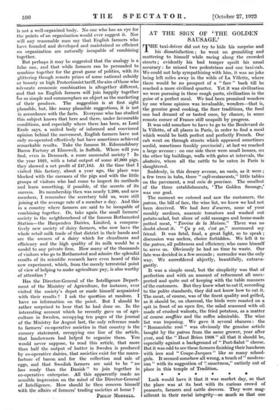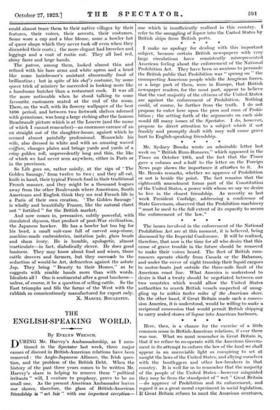AT THE SIGN OF 'THE GOLDEN SAUSAGE.'
THE taxi-driver did not try to hide his surprise and his dissatisfaction ; he went on grumbling and muttering to himself while racing along the crowded streets ; evidently his bad temper spoilt his usual accuracy : he missed two pedestrians and one taxi-cab. We could not help sympathizing with him, it was no joke being left miles away in the wilds of La Villette, where there would be no prospect of a " fare " back till he reached a more civilized quarter. Yet it was civilization we were pursuing in these rough parts, civilization in the guise of a perfect meal. We had been promised wonders by one whose opinion was invaluable, wonders—that is, the genuine good cooking, the finer traditions, the food one had dreamt of or tasted once, by chance, in some remote corner of France still unspoilt by progress.
It was odd somehow to have to go to the Boulevard de la Villette, of all places in Paris, in order to find a meal which would be both perfect and perfectly French. Our cab went on through streets which appeared sometimes sordid, sometimes frankly provincial ; at last we reached a large avenue : on one side there were small houses, on the other big buildings, walls with gates at intervals, the abattoirs, where all the cattle to be eaten in Paris is slaughtered.
Suddenly, in this dreary avenue, an oasis, as it were ; a few trees in tubs, three " cafe-restaurants," little tables on the pavement, a real coin de province. The smallest of the three establishments, The Golden Sausage,' was our goal.
The moment we entered and saw the customers, the patron, the bill of fare, the wine list, we knew we had not been deceived. We had hors d'ceuvres, none of your mouldy sardines, anaemic tomatoes and washed out potato-salad, but slices of cold sausages and home-made potted meat, " Terrine de la Maison." There was no doubt about it. " ca y est, c'est fa," murmured my friend. It was fatal, final, a great light, so to speak ; discussion was useless, choice forbidden. We left it to the patron, all politeness and efficiency, who came himself to serve us. Obviously he had no time to waste. Our fate was decided in a few seconds ; surrender was the only way. We surrendered abjectly, beautifully, extrava- gantly.
It was a simple meal, but the simplicity was that of perfection and with an amount of refinement all unex- pected and quite out of keeping with the table manners of the customers. But they knew what to eat if, according to the polite standards, they did not know how to eat it. The meat, of course, was of the finest quality and grilled, as it should be, on charcoal, the birds were roasted on a spit in front of an open fire, the salad seasoned with oil made of crushed walnuts, the fried potatoes, as a matter of course souffles and the coffee admirable. The wine list was imposing. We gave it several chances : the " Romaneche rose " was obviously the genuine article bought by the patron from the same grower, year after year, and the " Haut Brion 1908 " all that it should be, especially against a background of " Port-Salut " cheese. But it was odd to see these farmers finishing their luncheon with ices and ".Coupe-Jacques " like so many school- girls. It seemed somehow all wrong, a touch of " modern- ism " with its suggestion of 't smartness," entirely out of place in this temple of Tradition.
* * Luck would have it that it was market day, so that the place was at its best with its curious crowd of peasants, farmers and cattle drovers. They were mag- nificent in their racial integrity—so much so that one could almost trace them to their native villages by their features, their voices, their accents, their costumes. Some wore a cap and a blue blouse, some a bowler hat of queer shape which they never took off even when they discarded their coats ; the more elegant had breeches and leggings and a coat of rustic cut. They all had red, shiny faces and large hands.
The patron, among them, looked almost thin and refined with his bare arms and white apron and a head like some hairdresser's assistant abnormally fond of brilliantine ; but in spite of his chef's costume, by some queer trick of mimicry he succeeded in looking more like a handsome butcher than a restaurant cook. It was all the more noticeable when he stood talking to some favourite customers seated at the end of the room. There, on the wall, with its flowery wallpaper of the best 1890 period, and between two fretwork shelves adorned with geraniums, was hung a large etching after the famous Rembrandt picture which is at the Louvre (and the name of which I cannot remember)—an enormous carcase of an ox straight out of the slaughter-house, against which he seemed almost painfully professional. Meanwhile his wife, also dressed in white and with an amazing waved coiffure, changes plates and brings yards and yards of a crisp golden roll, unprecedently long and thin, the like of which we had never seen anywhere, either in Paris or in the provinces.
So Life goes on, rather noisily, at the sign of ' The Golden Sausage,' from twelve to two ; and they all eat, knife in hand, their typical French food in their traditional French manner, and they might be a thousand leagues away from the other Boulevards where Americans, South Americans and English think they see real French life in a Paris of their own creation. ' The Golden Sausage ' is wholly and beautifully France, like the natural claret not " fortified " for the British market.
And now comes in, persuasive, subtly powerful, with simulated shyness, that product of post-War civilization, the Japanese hawker. He has a bowler hat too big for his head, a small suit-case full of carved soap-stone, machine-made embroideries, imitation jade, glass beads and sham ivory. He is humble, apologetic, almost inarticulate—in fact, diabolically clever. He does good business. They may know about food and wines, those cattle drovers and farmers, but they succumb to the seduction of would-be Art, defenceless against the astute Jap. They bring " Beauty to their Homes," as he suggests with nimble hands more than with words. Idealists all 1 One is sentimental after a good luncheon— unless, of course, it be a question of selling cattle. So the East triumphs and fills the farms of the West with the rubbish so conscientiously manufactured for export only.
X. MARCEL BOULESTIN.















































 Previous page
Previous page